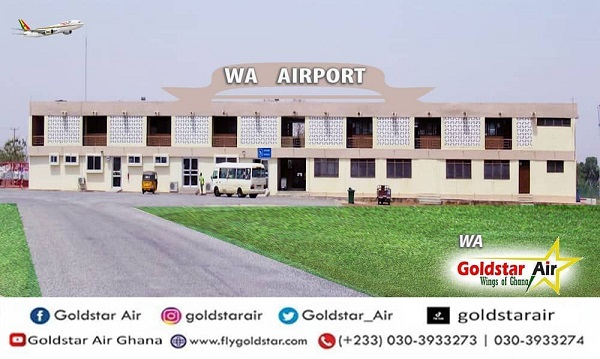Goldstar Air, the most promising airline of the year, will soon initiate flights to and from Wa Airport (WZA). The airport serves the people of the Upper West Region of Ghana and is operated by Ghana Airports Company Limited.
The Upper West Region is in the northwestern part of Ghana and is bordered by Upper East Region to the east, Northern Region to the south, and Burkina Faso to the west and north.
Wa Airport is the fifth busiest commercial airport in Ghana.
The Wa airport, located approximately 3 kilometers (1.9 miles) north of the city center, has a runway length of 2,015 meters (6,612 feet). It is the third longest airport runway in Ghana after Accra (3,403 meters) and Tamale (3,400 meters), followed closely in the fourth position by Kumasi (1,981 meters), Ho (1,900 meters), Takoradi (1,751 meters), and Sunyani (1,400 meters).
Ghana now has three major international airports, and then several secondary domestic airports, for a total of seven operating airports: Accra (ACC), Tamale (TML), Wa (WZA), Kumasi (KMS), Ho (HZO), Takoradi (TKD), and Sunyani (NYI).
Economic developers consider airports and airport services vital for generating local and economic growth. A regional airport serves traffic within a relatively small or lightly populated geographic area.
According to the Chairman and Chief Executive Officer of Goldstar Air, Eric Bannerman, the airline will soon initiate non-scheduled flights from international destinations to promote tourism and Hajj flights to and from Wa airport. Goldstar Air has been licensed by the Ghana Civil Aviation Authority (GCAA) to operate, alongside our West Africa and Intercontinental scheduled flights.
In line with the airline's strategic innovations, Wa Airport will be a catalyst for economic growth in the Upper West Region and the whole of the northern part of Ghana for our operations with the ability to operate 24 hours to stimulate employment for the youth.
By promoting ‘Destination Wa Airport,’ the airline aims to showcase Wa to the world and transform the region into a premier tourist destination and one of the world's most visited tourist sites and to amortize the airport for future investments and expansion, having in view passengers from far and near.
The value of regional air service does not only support the business traveler but also provides quality of life for the residents of small communities, ensuring access to national and even global destinations. Additionally, incoming tourism dollars bring much-needed revenue to a small town or city. Wa has much to offer in arts and culture, outdoor adventures, history and heritage, unique dining experiences, and local events.
A regional airport usually does not have customs and immigration facilities to process traffic between countries. Commercial airports are powerful economic engines generating billions of dollars in annual activity and supporting millions of stable, good-paying jobs. Some underdeveloped, decentralized regions become attractive tourism destinations because of the development of an airport.
Often, another significant challenge for smaller rural communities is attracting medical professionals to the area. Reliable air service can be critical to the decision-making process for these professionals to relocate to the area. Alternatively, reliable air service can provide residents access to vital medical care in larger cities.
Commercial air service is important to economic growth and the quality of life in rural communities. Businesses in these communities need access to medium hubs, allowing connections to the national transportation system. This is a key factor in deciding on the location of business headquarters. Local industries need the convenience of daily flights to attract customers and employers, bringing much-needed revenue to the local market.
Mr. Bannerman emphasized that Goldstar Air’s journey is a clear vision to use the power of air travel to create a better future for the next generation, boost trade and tourism, and open new employment opportunities for Ghanaians. Our substantial investment in the aviation industry will enable us to gain market share on key long-haul routes to and from our hubs and drive more business and leisure travelers to Ghana.
Airports already play an important role in the community, at both local and global levels, and their influence will only increase as the aviation industry grows in Ghana. The global commercial aviation fleet is expected to expand by 33%, to more than 36,000 aircraft by 2033.
Meanwhile, Airports Council International (ACI) World predicts an average annual growth of 5.8% in passenger traffic between 2022 and 2040. By 2040, more than 19 billion passengers will pass through world airports each year.
Denver International Airport and the Colorado Department of Transportation’s (CDOT) Division of Aeronautics announced that Denver International Airport’s (DEN) contribution to the state of Colorado’s economy increased by nearly 30 percent. This statistic is according to the Division of Aeronautics’ 2020 Statewide Aviation Economic Impact Study. Denver has become a $ 33.5 billion economic engine for the state and a driver for increased business and travel.
According to a recent economic impact study conducted at America’s commercial airports, 10.8 million people have jobs because of these airports, and some employees work directly for an airport operator. Others are employed by concessionaires, government agencies, and other entities doing business at airports.
For small towns and cities like Wa, accessible local air travel is a critical link between a community’s economic vitality. The local economy suffers when there’s a lack of access to the national transportation system. Air service is crucial for any region looking to attract an industrial presence. Providing local businesses access to the global market can help attract and retain business in a community, thus providing jobs and economic prosperity for the area and its residents.
Communities like Wa can obtain economic benefits from connection to our global air transportation network. For instance, direct service to our large airline hubs will provide one-stop access to hundreds of additional destinations around the globe. As Ghana’s economy grows and smaller communities struggle to compete in the global marketplace, airports have become vital to survival.
Regional airports are component elements of the global aviation network, fulfilling functions such as feeding hub airports, facilitating low-cost carriers (LCCs), and providing essential air services in remote and rural regions. In this way, Wa, Takoradi, Ho, and Sunyani regional airports in Ghana will strengthen air connectivity and territorial cohesion of Ghana. Moreover, this made regional airports start ensuring more employment opportunities.
More specifically, regional airports could benefit from increases in revenues and enhancing economic development which plays a major role in the tourism experience; therefore, the airline will create tailor-made tour packages around all regional airports. This approach aims to streamline the customer experience, reduce end-to-end travel time, and add value to passenger services, as the airline wants to make all airports in Ghana very busy.
Regional airports are vital in connecting rural and smaller communities to global commerce, which helps businesses expand and attracts new companies to the area. Although Wa Regional Airport now serves relatively few passengers, a recent United States National Aeronautics and Space Administration (NASA) report suggests that their importance could increase as technology advances make flights in smaller aircraft greener and more affordable.
Wa airport will also play a vital role in Ghana’s aviation industry by connecting the Upper West Region through our 24-hour service hubs to West Africa and the rest of the world, supporting economic development, trade, and tourism in the region and serving as an alternative airport to Tamale International Airport.
Goldstar Air envisions these enhancements to regional airports contributing to a solid return on investment (ROI) and it is part of the over one hundred thousand direct jobs the airline is creating and will reopen all the airline’s regional offices, which include Wa, Ho, Sunyani, Takoradi, and other cities to create more employment for Ghanaians.
Wa is known for its rich history and cultural heritage, with a mix of traditional and modern architecture. The town is home to the Wa Naa Palace, the seat of Wa Naa, the Paramount Chief of the Wala people. The Palace symbolizes the town’s rich cultural heritage and is a popular tourist attraction. The Airline Management Team will soon make a paid courtesy call to Wa Naa, Fuseini Seidu Pelpuo IV, to officially inform him about our intentions to operate some non-scheduled flights from Wa airport.
The town has a vibrant market, where locals sell traditional crafts, food, and other goods. Wa has a tropical savanna climate, with a rainy season from May to October and a dry season from November to April, and is also known for its traditional cuisine, including dishes such as ‘tuo zaafi’ (a thick corn porridge) and ‘koko’ (a spicy corn drink).
Overall, Wa is a vibrant and culturally rich town that offers a unique experience for visitors and residents alike. The aviation industry is an economic generator. It equates to jobs and income. There is an important link between an airport and a community’s economic vitality, and having a local airport attracts talent. Many businesses depend on this important industry to access markets and the nation’s air transportation system.
Goldstar Air will initially operate flights from Kumasi Prempeh 1 International Airport to Rome, Madrid, Hamburg, London, Dusseldorf, and Milan.
Also, flights from Accra Kotoka International Airport shall include destinations such as Washington, Dubai, Lagos, Toronto, Monrovia, Conakry, Abidjan, Guangzhou, Dakar, Banjul, Rhode Island, London, and Freetown.

Press Releases of Monday, 27 May 2024
Source: Goldstar Air













